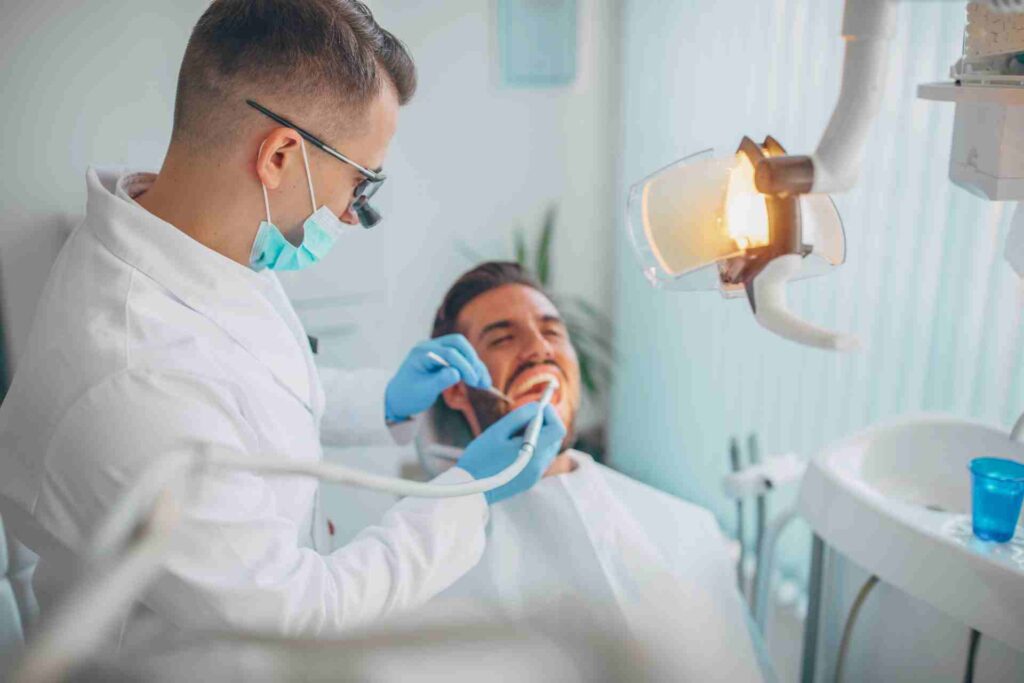Normal vs. Abnormal Sharp Teeth
Knowing the difference between normal and abnormal sharp teeth is important for taking care of your oral health. Natural tooth shape variations include sharper teeth like canines, which serve specific purposes. These naturally sharp teeth help us tear food and keep our mouths working properly, playing a key role in our everyday eating habits.
Differences Between Normal Sharpness and Abnormal Conditions
Having normal sharpness in your teeth is perfectly fine and serves important functions without causing any discomfort. However, abnormal sharp teeth can lead to various problems. If you experience discomfort or injury due to the sharpness of a tooth, it could be a signal that something needs to be checked out.
Symptoms Associated with Sharp Teeth
Be watchful for common symptoms indicating problematic sharp teeth:
- Tongue Irritation: A sharp tooth might repeatedly irritate or cut the tongue.
- Discomfort While Chewing: Abnormal sharpness can make eating difficult or painful.
- Increased Tooth Sensitivity: Greater susceptibility to hot or cold temperatures.
In addition to these symptoms, look for visual signs of sharp teeth:
- Jagged Edges: Uneven or rough edges on teeth may indicate excessive sharpness.
- Visible Chips or Cracks: Damage to the tooth’s surface can create sharp points detrimental to oral health.
Common Causes of Sharp Teeth
Several common causes contribute to having sharp teeth, and being aware of them is the first step toward maintaining good oral health. Below are some primary causes and how they affect your teeth.
Teeth Grinding (Bruxism)

What is bruxism? Bruxism is when people grind or clench their teeth, often without realizing it, especially while they sleep. But it can also happen during the day. It’s not just a pesky habit; it can really damage your teeth by wearing down the enamel and creating those sharp, uneven edges.
- Daytime vs. Nighttime Habits: Bruxism can occur both during wakefulness and sleep. During the day, stress or focus might trigger grinding. At night, it is often linked to sleep disorders.
- Role of Stress and Anxiety: Emotional pressure can lead to bruxism. Understanding your stressors can be a step toward preventing teeth grinding.
- Impact of Sleep Disorders: Conditions like sleep apnea and insomnia are commonly associated with nighttime bruxism.
How bruxism leads to sharp teeth is through the incessant grinding and clenching. This action gradually wears down the enamel—the tooth’s protective layer—resulting in sharp tooth edges that can damage the mouth’s soft tissues.
Tooth Erosion
What causes tooth erosion? The main culprits behind enamel erosion are acidic foods and drinks, such as soda and citrus fruits, which can gradually wear down your tooth enamel. Acid reflux also plays a role by bringing stomach acids into your mouth, further attacking that protective layer. Plus, having a dry mouth can make things worse since saliva helps neutralize acids and keep your teeth safe. So, it’s important to be mindful of what you consume and how it affects your dental health!
- Long-term effects of erosion include thinning of the enamel, leaving teeth vulnerable. This can lead to sharp, jagged edges that may irritate your tongue and gums.
- Preventive tips: Limit acidic food intake, drink water often, and practice good oral hygiene to protect your enamel.
Dental Trauma or Accidents
How trauma causes sharp teeth is straightforward yet impactful. When accidents happen—like a fall or a hit during sports—a tooth can easily chip or fracture, resulting in sharp, uneven surfaces.
Common accidents leading to sharp teeth include:
- Sports-related injuries: Always wear a mouthguard during contact sports.
- Car accidents: Sudden impact can cause damage to teeth.
- Falls: Simple slips can result in tooth damage.
- Biting down on hard foods: Items like nuts, ice, or hard candy can be risky.
Genetic Factors
Inherited sharp or irregularly shaped teeth can run in families. Some people are genetically predisposed to have teeth that are sharper or develop unevenly, which is a completely natural aspect of their dental genetics. While this might not always lead to immediate issues, understanding genetic influences can help in managing future dental health.
- How genetics affect tooth wear: Those with naturally thin or sharp enamel may be more prone to wear over time. This can happen because less enamel means less protective covering, which may lead to more pronounced sharpness as you age.
- Managing genetic predispositions: Regular dental check-ups and good oral hygiene practices can help mitigate the effects of genetics on your teeth.
Sharp Teeth After Dental Cleaning

You might wonder, why do teeth feel sharper after a dental cleaning? The reality is that plaque and tartar build-up create a softer film over the teeth surfaces. When these are professionally cleaned away, the edges of your teeth might feel more pronounced initially. This is simply your teeth returning to their natural state.
- Is this normal? Absolutely! This sensation is temporary and is a sign of a great cleaning, revealing the natural contours of your teeth.
- What to expect after a cleaning: As your mouth adjusts, the sharpness you feel usually diminishes within a few days. It’s a normal part of maintaining a healthy, clean smile.
How to Fix Sharp Teeth: Available Treatments
Dental Contouring and Filing
What is tooth contouring? It’s a quick, non-invasive procedure that smooths and reshapes sharp or jagged teeth.
How it works: A dentist uses a drill or laser to file down small enamel areas, effectively evening out rough edges.
Who is a good candidate for contouring? This treatment is best suited for patients with minor sharpness or chips in their teeth.
What to expect during a contouring procedure:
- Consultation: Discuss your oral health goals with your dentist.
- Examination: Your dentist evaluates the teeth to determine the best approach.
- Procedure: The dentist carefully files the enamel, smoothing the tooth surface.
- Recovery: Minimal downtime; enjoy your improved smile right away.
- Aftercare: Keep up with regular oral hygiene to maintain results.
Dental Bonding
What is dental bonding? A cosmetic procedure where a tooth-colored resin is applied to reshape and smooth out sharp or uneven areas.

How bonding works: The resin is molded over sharp points, then hardened with a special light and polished to blend naturally with the tooth.
Who is it best for? Ideal for patients with moderate tooth wear or chipping that needs reshaping.
What to expect during a dental bonding procedure:
- Consultation: Discuss your goals with your dentist.
- Preparation: Numb the area if needed.
- Bonding Process: Usually takes 30 to 60 minutes per tooth.
- Finishing Touches: The bonding is applied, shaped, and then hardened with a special light.
- Result: Walk away with a beautifully enhanced smile!
Veneers and Crowns for Severe Cases
What are veneers and crowns?
- Veneers: Thin shells placed over the front of teeth to cover sharp edges or fractures.
- Crowns: Caps encasing the entire tooth, offering complete protection for severely damaged teeth.
How they work: Veneers provide a smooth, natural look for minor sharpness, while crowns restore function and shape for more significant damage.
Who is it best for? Veneers are ideal for those looking to improve minor imperfections, while crowns are suited for individuals with severely damaged or decayed teeth.
What to expect during a veneer/crown consultation:
- Dental Checkup: Check teeth condition.
- Discuss Goals: Identify aims for veneers or crowns.
- Images and Molds: Take pictures or molds for proper fit.
- Veneer and Crown Options: Explain choices.
- Procedure Details: Share what to expect during and after treatment.
- Q&A: Answer questions and concerns.
Night Guards for Teeth Grinding (Bruxism)
What are night guards? Custom-made devices worn during sleep to prevent teeth grinding and further damage.

How they work: Night guards create a barrier that protects teeth from grinding, preventing sharpness from worsening.
Who should use night guards? Recommended for patients with bruxism to prevent further enamel wear.
Preventing Sharp Teeth: Long-Term Solutions
Managing Bruxism and Stress
Bruxism, or teeth grinding, is a common cause of sharp teeth, and managing stress plays an important role in its reduction. Many people unconsciously grind their teeth when stressed, exacerbating tooth wear and leading to sharper edges.
- Stress-relief techniques are essential in combating this habit. Consider incorporating mindfulness practices such as meditation and deep-breathing exercises into your daily routine. These methods can significantly lower stress levels, reducing the likelihood of grinding.
- Relaxation exercises like yoga and progressive muscle relaxation help mitigate tension throughout the body, even during sleep. Taking a moment to unwind before bedtime can prevent nighttime grinding.
- For persistent bruxism, professional therapy can address underlying issues. Cognitive-behavioral therapy (CBT) and biofeedback have shown effective results in altering unconscious habits and mindset.
Seeking Treatment for Sleep Disorders

Underlying sleep disorders, such as sleep apnea, can contribute to bruxism. Treating these conditions can alleviate many symptoms associated with nighttime teeth grinding.
- Consult a sleep specialist if you experience difficulty breathing during sleep or frequent awakenings. They can provide solutions such as continuous positive airway pressure (CPAP) therapy, which can improve sleep quality drastically.
- Lifestyle modifications, including maintaining a regular sleep schedule and creating a calming sleep environment, support better rest and reduce symptoms. Limit caffeine and alcohol intake before bed, as they can exacerbate sleep issues and contribute to tooth grinding.
- Regular check-ins with your dentist are vital to monitor and manage bruxism effects. They can recommend custom night guards, ensuring your teeth are protected while long-term solutions are pursued.
Protecting Your Teeth from Erosion
Maintaining a diet that protects your enamel is key to preventing tooth erosion. Start by limiting acidic foods and drinks, which may include soda, citrus fruits, and coffee. These can wear down your enamel over time if consumed excessively.
- Drink Water: After eating acidic foods, drink water to help neutralize acids and rinse your mouth.
Consider incorporating foods that strengthen enamel into your diet to keep your teeth strong. Dairy products, leafy greens, and foods rich in phosphorus play an important role in maintaining dental health by supplying necessary nutrients to your enamel.
Regular Dental Checkups

Routine dental exams are crucial. They allow dentists to catch early signs of tooth wear, bruxism, and other dental issues before they develop into more serious problems.
- Enamel Health Monitoring: Your dentist will keep an eye on enamel health and suggest solutions if problems arise.
- Address Grinding Issues: If grinding is detected, customized treatment plans like night guards can be suggested.
Key Takeaways
- Sharp teeth can result from various factors: Bruxism, tooth erosion from diet and acid, trauma from impacts, genetics affecting tooth shape and strength, and temporary sharpness post-dental cleaning.
- Dental Solutions for Sharp Teeth: Treatments include contouring for minor imperfections, resin bonding, veneers for a natural look, and night guards to prevent grinding damage.
- Prevention: To prevent sharp teeth, manage stress with relaxation techniques to reduce bruxism.
- Diet: Protect your enamel by maintaining a balanced diet and limiting acidic foods.
- Checkups: Regular dental checkups ensure consistent monitoring and professional advice.





















